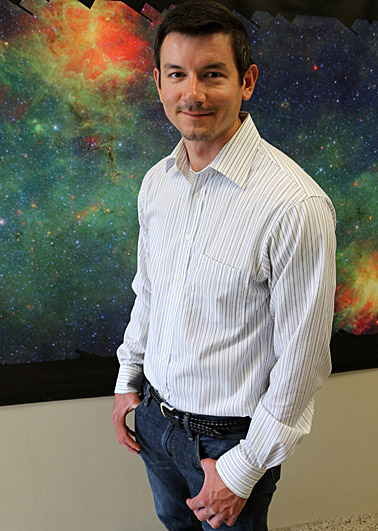
Thomas Allen, a doctoral student researching star formation, posed for a photo in Ritter Planetarium.
Between watching the Discovery Channel growing up and the “night the lights went out,” Allen, a graduate student in the Department of Physics and Astronomy at The University of Toledo, found his love for astronomy and specifically for the formation of stars.
Recently, he has been observing a star-forming region of space as part of his PhD thesis work. His work touches on the question “Where do we come from?” by examining stars and accompanying solar systems in the process of forming.
Allen’s study on star birth within the cluster of Cep OB3b located in the northern constellation of Cepheus, including the different stages of the process and the changes that stars endure, was acknowledged in a recent news announcement from the National Optical Astronomy Observatory.
To obtain data, Allen and his team spent four nights of observing time with the 0.9-meter telescope at the WIYN (University of Wisconsin, Indiana University, Yale University and the National Optical Astronomy Observatory) Observatory on Kitt Peak near Tucson, Ariz.
“The research connects UT with the wider astronomical community and brings us more prestige and awareness for the work we are doing here,” Allen said. “Through the research group that I joined as an undergraduate, I had the opportunity to work with Professor Thomas Megeath on a few projects. I considered Toledo so that I could work with him and continue the research that I enjoy.
“Upon visiting Toledo, I found a department that is active, dynamic and takes an interest in its students. It is the combination of research opportunity and department environment that led me to choose Toledo. The choice is even better now that we are partners with the Discovery Channel Telescope.”
This recognition for Allen comes on the heels of UT joining a consortium with the Discovery Channel Telescope, the fifth largest telescope in the continental United States and one of the most technologically advanced.
“In particular, the Discovery Channel Telescope will be something I can use to continue my research in the future,” Allen said.
Allen will continue his thesis work by studying massive young clusters of stars during the next year as he looks to complete his PhD in astronomy and gain a better understanding of the conditions that form planets and maybe help answer the question “Where do we come from?”